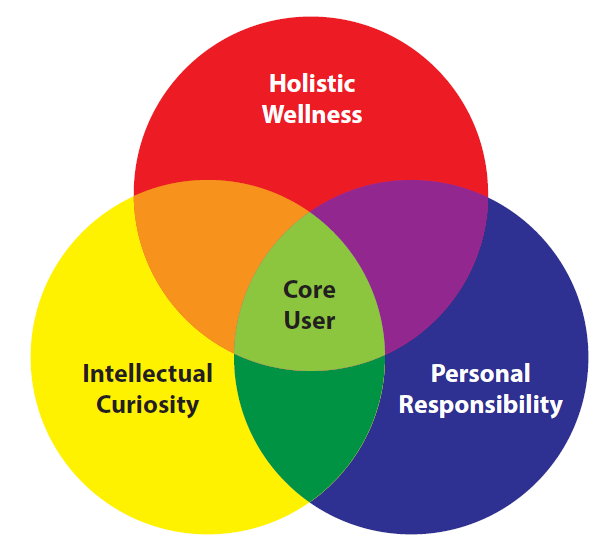
A profile of today's core supplement userA profile of today's core supplement user
Research conducted by NBJ and Next found that key supplement users consider supplementation to be an essential component of a holistic approach to maintaining health and avoiding reliance on the traditional healthcare industry.
July 8, 2015

 In troubled times, any industry would do well to focus on its core values and—by extension—its core consumers. Periods of healthy growth offer an opportunity to expand the circle, but in times of crisis, as less dedicated consumers drop out of the picture and the circle shrinks, everything comes back to the core. Brands who lose sight of that have nothing to fall back on.
In troubled times, any industry would do well to focus on its core values and—by extension—its core consumers. Periods of healthy growth offer an opportunity to expand the circle, but in times of crisis, as less dedicated consumers drop out of the picture and the circle shrinks, everything comes back to the core. Brands who lose sight of that have nothing to fall back on.
The supplement industry is clearly in troubled times. From the New York Attorney General investigation to the Dr. Oz implosion to repeated studies calling supplement efficacy into question to a growing consumer sentiment that a healthy diet on its own will supply all essential nutrients, the supplement industry is being battered.
With that in mind, NBJ and the NEXT team set out to define and identify the core supplement user (CSU), with the goal of providing insights and context that individual brands and industry groups can use to strengthen their positions, even in these troubled times. We used interviews with industry insiders, along with NBJ’s own data and research, to develop screening criteria to create a representative group of CSUs. We then conducted in-depth interviews to explore the values and beliefs that drive their behaviors with regard not just to supplements but health and wellness in general.
What we found: CSUs are committed to supplements as part of their lifestyles, regardless of negative media stories and journal studies.
That the commitment stems from three main things: A dedication to holistic wellness, intellectual curiosity, and a sense of personal responsibility for their own health needs.
These consumers focus heavily on food choices. But while they feel strongly that their healthy diets meet their nutritional needs, they still rely on supplements as key parts of their overall approach to health and wellness. The main benefits for them are prevention, nutritional enhancement and avoidance of prescription medication.
Our research also suggests that, for these users, supplements are a belief-driven industry. CSUs are independent thinkers who value personal experiences over media stories and journal studies. The key question driving their health and wellness decisions is not what others are saying but, rather, “How does this make me feel?”
Defining the core user's values
 Holistic Wellness
Holistic Wellness
• View that food is nutrition
• Focus on addressing root of health conditions, not symptoms
“The core user is a conscious consumer who has a healthy lifestyle that focuses on local, organic, and non-GMO food to ensure they are getting
the proper nutrition.”—Debra Stark, owner, Debra’s Natural Gourmet
Intellectual Curiosity
• Drive to make informed decisions
• Lack of faith in mainstream trends/marketing/news
• A belief that they do not trust anyone blindly
“This consumer values intelligence. She has an appreciation for knowledge and science and does her own research.”—Robert Craven, CEO, MegaFood
Personal Responsibility
• Desire to be less reliant on medical intervention/pharmaceuticals
• Belief that a preventative approach will require less invasive medical treatments
• Belief that they are prolonging their lives
“They want to be empowered to take care of their own healthcare. They are focused on prevention.”—Don Summerfield, co-founder, Pharmaca
Identifying the core supplements user
Motivations
Major medical events are often key catalysts for respondents to change their lifestyles. “I was in a bad car accident that caused a spinal cord injury, and I’ve been suffering from migraines since. After numerous bad experiences at the doctor, I tried an integrated-medicine doctor. He recommended I try an anti-inflammation diet…I no longer have to take migraine medicine since making major changes to my diet and lifestyle.”—Kerra
Personal experiences drive CSUs, even when the resulting lifestyle choices make for difficult social situations. “There are a lot of negatives. It can be socially isolating because people don’t understand it or don’t believe it. However, I know how much better I feel, which makes it worth it.”—Melissa
Beliefs
Intuition drives food choices. “We aren’t vegan or vegetarian; we are balanced. We eat what makes us feel good and our bodies feel good.”—Dawn
No one type of diet defines the CSU. Respondents cited myriad diets, including vegan, vegetarian, raw paleo, gluten-free, dairyfree, etc.
CSUs stress the nutritional importance of buying organic, local, and non-GMO products. Respondents stated that they prefer these types of products because they are more nutritious and have the added benefit of being environmentally friendly.
Mind and Body
They believe physical activity promotes mental wellbeing. Respondents stated that they thought it was important to get up and move daily, with many claiming that exercise was the one thing they did for themselves.
Mindfulness and positive attitude are essential. “For me, wellness encompasses so many different things. There is the physical, the food and diet, spiritual, and your mindset and outlook on life. I think so many people don’t realize that you can be physically active and eat healthy, but without the right mindset, you might not be healthy.”—Julie
Traditional Medicine
CSUs believe traditional medicine and doctors are for emergency care—not for disease management. Respondents said traditional doctors are good for things like broken bones but that they do not understand how to prevent or manage disease. “Don’t get me wrong: Doctors have a purpose. But they are not the place I go first. I think doctors are really just there for when you need them.”—Indira
They see prescription drugs as a last resort, not a first line of defense. “The majority of doctors aren’t educated in natural methods and turn to drugs first, versus last. I have a friend who is 60 and has diabetes. Her doctor put her on medicine, then gave her injections. She just had to have surgery to amputate her toes. None of that would have been necessary if he would have recommended a healthier diet.”—Vicky
They believe a healthy lifestyle is key to disease prevention. “I think if your body is healthy, it can fight off any disease.”—Emily
CSUs trust personal experiences over medical advice. They believe that they know their bodies better than any medical professional. “I listen to my body. You have to trust your own instincts, because there is so much controversial information out there.”—Emily
Their information approach: Personal experience + advice + research. CSUs are constantly seeking out new information and believe they are their own best health advocates. “I read everything and never trust one source. I want to be well versed about health and wellness.”—Kerra
CSUs like to share their knowledge and lead their friends and families toward healthier lifestyles. They believe that their personal experiences plus their own research makes them experiential health and wellness experts.
Supplements
CSUs see supplements as preventative insurance. Though respondents view food as the most important source of nutrition, they see supplements as essential for preventing illness. Supplements they seek out: Multivitamins, Vitamin D, Omegas.
CSUs who follow vegan or vegetarian diets, in particular, believe they need to augment their diets with vitamins and minerals. Supplements they seek out: B12, enzymes.
Some respondents turn to supplements when they are feeling under the weather or want to avoid prescription medications. Supplements they seek out: Herbs and botanicals, essential oils, zinc. “I think essential oils are really important. I have a bunch of them in my medicine cabinet, and they have been critical in getting me off prescriptions for my migraines and even helped get my daughter off antidepressants.”—Dawn
CSUs are aware of quality issues in the supplement industry. Respondents seek out whole foods and quality supplements that do not contain fillers or additives. “Supplements can’t be a solution to a crappy diet. You need to eat a whole-food, minimally processed diet for the supplements to be effective. Supplements aren’t going to change the fact that you’re eating fast food and not going to the gym. And cheap, low-quality supplements are a waste of money.”—Deborah
CSUs value their personal experiences over news stories and journal studies. “When I hear negative press, I start doing my own research and apply some common sense. Sometimes you just need to test to see what you believe and how it makes you feel.”—Julie
These users are the foundation of the nutritional supplement industry. Their sense of themselves as independent thinkers is key to their sense of self. For them, personal experience is paramount, but they back that up with research from sources they trust. Those tend not to be traditional media and science outlets. CSUs look to sources in the holistic wellness space and value the sense of discovery that comes from seeking out this information.
For CSUs, supplementation is not an isolated act but an essential component of a holistic approach that focuses on food, activity, and supplements to maintain health and avoid reliance on the traditional healthcare industry. To best reach and serve these consumers, brands and industry groups need to think about both their messages and how they get them out. Messaging around preventative healthcare and especially around how good it feels to be healthy will have traction with CSUs, as will language around fulfillment and pride in taking personal responsibility for one’s own health. “This is good for you,” won’t have as much traction as “You know what’s good for you.”
Given CSU's strong and growing belief in the power of a healthy diet, supplements should be positioned not as an end or even as a separate category but as an essential component of a three-pronged approach to wellness that includes supplements, diet, and exercise.
In terms of getting those messages out there, it's important to remember that CSUs value discovery. Telling these consumers what you want them to hear won't have nearly the same traction as putting a message out there in ways that make it easy for them to discover it. Think: Social media and blogs and practitioners in the holistic-wellness space.
As the supplement industry looks to find its center, the core supplement user is there to help.
You May Also Like



